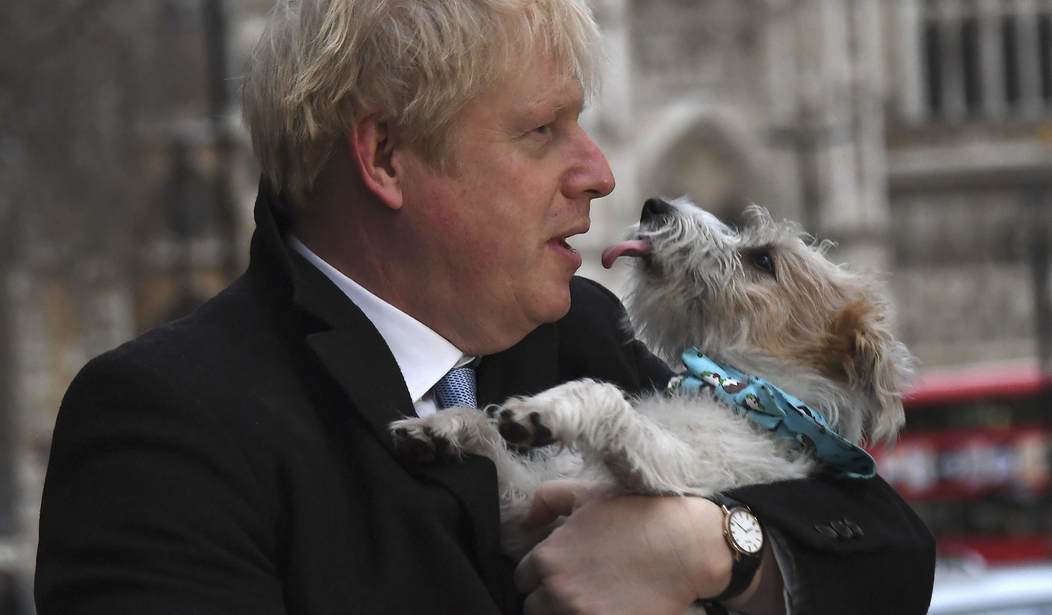Exit polls in Great Britain are showing a huge landslide win for Boris Johnson’s Conservative Party, giving the prime minister an absolute majority government — the first since Margaret Thatcher in 1987.
The exit polls, which have been accurate in the past, give the Conservatives a total of 368 MPs — 50 more than 2017 and a majority in Parliament. They won those seats largely at the expense of the Labor Party, which lost 71 seats, which will give them a total of 191. The Liberal Democrats, who tied their fortunes to the “Remain” side, will gain one seat, while the Scottish National Party, riding a wave of anti-Brexit sentiment, will gain 20 seats — most of them at the expense of Conservatives. In fact, there will be only one Conservative MP left in Scotland.
The Labor Party is in ruins, and the left knows just who to blame.
Sorry @daneacross this is one mans fault. His campaign, his manifesto, his leadership. @jeremycorbyn https://t.co/Oo23Ai1uqu
— Siobhain McDonagh MP (@Siobhain_Mc) December 12, 2019
This sort of hyperbole sounds familiar:
This looks abysmal. The result will be devastating for communities like mine all around the country who are now facing five years of Boris Johnson with unchecked power. I am more fearful for our country than at any point in my lifetime.
— David Lammy (@DavidLammy) December 12, 2019
Blame everything but your rancid policies:
We’re going to hear the Corbynistas blame it on Brexit and the Labour Uber Remainers blaming Corbyn. Both are to blame for what looks like a terrible night for Labour. Both have taken for granted Labour’s heartlands. Sorry we couldn’t offer you a Labour Party you could trust.
— Caroline Flint (@CarolineFlint) December 12, 2019
Meanwhile, Prime Minister Johnson has a decisive mandate from the voters to leave the European Union. No second referendum will happen. No last-minute reprieve for the Remain side. Great Britain is gone and the rest of Europe is going to have to adjust to that.
Prime Minister Boris Johnson’s Brexit divorce deal has been agreed in principle by the U.K. Parliament, but is yet to be fully ratified by lawmakers. There have been deep divisions over the deal on offer, and how close the U.K. should stay aligned to the EU after its departure from the bloc. The future of the border between the Republic of Ireland and Northern Ireland has also been a major sticking point.
The impasse and political chaos in the House of Commons ultimately led to Thursday’s snap general election as Johnson lost the slim majority he held in the U.K.’s lower chamber of Parliament. The vote is the first to be held in the winter months since 1974 and the first December election since 1923.
The Conservatives targeted dozens of districts held by Labor that voted to leave the EU. The strategy worked better than expected:
The exit poll suggests the Tory strategy of targeting leave-voting Labour seats in the Midlands and North of England might have paid off, with Boris Johnson’s party expected to have made gains at the expense of Labour.
In contrast, the Conservative share of the vote is expected to fall back on the 2017 general election in those areas that voted most strongly for Remain in the 2016 EU referendum, while Labour’s vote is expected to fall back rather less, according to polling expert Sir John Curtice.
As a result, the Conservative share of the vote is expected to be slightly lower in London and Scotland and do little more than replicate the 2017 result in the South East outside of London.
It’s rare that an electorate in a democracy makes their wishes known so forcefully. The British people want to be free of the deadening hand guiding their economy from the Hague and be free to make their own rules, their own trade deals, while not being forced to put up with the stifling regulations from the European Union.
It’s a risk, to be sure. There is no guaranteed outcome. There may be some initial confusion, even chaos. But in the long run, the British people and the British economy should benefit from the split.










Join the conversation as a VIP Member